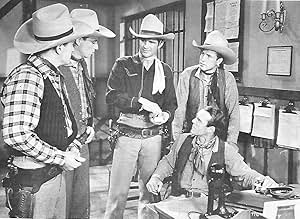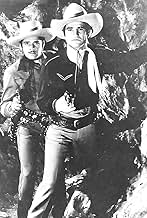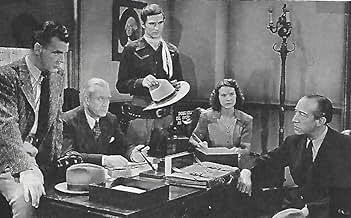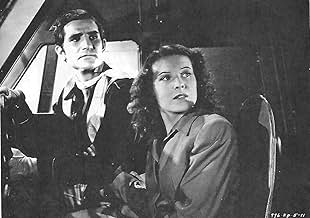Füge eine Handlung in deiner Sprache hinzuTom King sets out to avenge his father's murder when a gang of saboteurs devastate the Bordertown oil fields.Tom King sets out to avenge his father's murder when a gang of saboteurs devastate the Bordertown oil fields.Tom King sets out to avenge his father's murder when a gang of saboteurs devastate the Bordertown oil fields.
Sammy Baugh
- Ranger Tom King Jr.
- (as Slingin' Sammy Baugh)
Rudolph Anders
- His Excellency [Chs. 1,3,6,10-12]
- (as Robert O. Davis)
Kenne Duncan
- Nick - Henchman [Chs. 1-4,6-9]
- (as Kenneth Duncan)
Empfohlene Bewertungen
Shortly after the conclusion of the 1940 NFL season, Republic executive Bill Saal (Texas Christian University alum)called Washington Redskins quarterback Sammy Baugh (Texas Christian University alum)at his ranch near Rotan, Texas about the prospects of Baugh starring in a Republic serial; A telephone conversation that led to one of the best overall serials Republic Pictures Corporation produced in their valley of the cliffhangers.
Republic assigned five writers to this serial and each writer was given a specific chapter to work on: Norman S. Hall on Chapter 1 (The Fifth Column Strikes) and Chapter 6 (Double Danger); Joseph Poland (and billed as such)on Chapter 2 (Dead End), Chapter 7 (Death Takes the Witness) and Chapter 11 (Trail of Death); William Lively on Chapter 3 (Man Hunt)and Chapter 8 (Counterfeit Trail); Ronald Davidson on Chapter 4 (Trapped), Chapter 9 (Ambush)and Chapter 12 (Code of the Rangers), and Joseph O'Donnell was given Chapter 5 (Test Flight) and Chapter 10 (Sky Raiders.) Based on the order of chapter numbers (1-2-3-4-5) one might assume (if one was given to making assumptions and there are ones who do) that such was the writer's order on the screen credits...but one would assume (as assumers often do) incorrectly. Republic, as they most often did, credited the writers in (nearly) alpha order on the screen credits ( Davidson, Hall, Lively, Poland and O'Donnell, and gave each an Original Screen Play (not a typo and not written as one word--- Screenplay) credit.
The October, 1941 release of this serial pre-dated The Japanese attack on Pearl Harbor and FDR's Declaration of War against the Axis powers by more than two months (and most of the writing assignments carry April, 1941 dates), and is just one of the many "watch-out"/preparation films and serials Hollywood produced circa 1938-December 7, 1941. Truly, taken in context of the time and era and limitations of serial budgets (and judged against serials and not "Citizen Kane",) "King of the Texas Rangers" ranks high as a great example of serial-making at its best.
Republic assigned five writers to this serial and each writer was given a specific chapter to work on: Norman S. Hall on Chapter 1 (The Fifth Column Strikes) and Chapter 6 (Double Danger); Joseph Poland (and billed as such)on Chapter 2 (Dead End), Chapter 7 (Death Takes the Witness) and Chapter 11 (Trail of Death); William Lively on Chapter 3 (Man Hunt)and Chapter 8 (Counterfeit Trail); Ronald Davidson on Chapter 4 (Trapped), Chapter 9 (Ambush)and Chapter 12 (Code of the Rangers), and Joseph O'Donnell was given Chapter 5 (Test Flight) and Chapter 10 (Sky Raiders.) Based on the order of chapter numbers (1-2-3-4-5) one might assume (if one was given to making assumptions and there are ones who do) that such was the writer's order on the screen credits...but one would assume (as assumers often do) incorrectly. Republic, as they most often did, credited the writers in (nearly) alpha order on the screen credits ( Davidson, Hall, Lively, Poland and O'Donnell, and gave each an Original Screen Play (not a typo and not written as one word--- Screenplay) credit.
The October, 1941 release of this serial pre-dated The Japanese attack on Pearl Harbor and FDR's Declaration of War against the Axis powers by more than two months (and most of the writing assignments carry April, 1941 dates), and is just one of the many "watch-out"/preparation films and serials Hollywood produced circa 1938-December 7, 1941. Truly, taken in context of the time and era and limitations of serial budgets (and judged against serials and not "Citizen Kane",) "King of the Texas Rangers" ranks high as a great example of serial-making at its best.
Even though the Dick Tracy serials, Capt. Marvel, both Batmans, and Superman were very enjoyable, you cannot beat this movie for continuous unique action scenes and storylines that were made up just for this serial and not just using up "stock shots" made for other serials. If I were to pick one serial to be the very best one I would have to pick this one.
A cynic might say this is King of the Royal Mounted in the Texas oil fields, but it has its own atmosphere. Sammy Baugh does not attempt to overstep either his role or his acting ability and comes across as well as any of Republic's western stars. He is surrounded by pros, especially the bad guys, and has the ever popular Duncan Renaldo as a right hand man. There is an ample mixture of horses, roadsters, l930s air planes, speedboats, even a Zeppelin and a heroine who is her own man, a professional working girl, a trait for which Republic's B action movies are only now receiving credit. As with many other Republic westerns and serials, the soundtrack music rang in my head all these years and was just as I remembered it.The trick is to tell the Fords, GM and Chryslers apart.
This is one of the greatest of Hollywood's serials and made by the Tiffany of serial studios: the great Republic Studio. Made in l941, this is a classic serial to watch if you've never seen one. 'Slingin' Sammy Baugh, a real-life football hero back in the early 40s is the hero. Fascinating B-actress, Pauline Moore, is his plucky companion. Together they tear through this movie, dodging exploding oil wells, car wrecks, blazing fires, floods. Wonderful production values, super music and editing. The kiddies should have the thrill of their lives with this knockout entertainment
In a recorded interview late in his life, Sammy Baugh said of "King of the Texas Rangers" "I wasn't very good."
Wrong: He did have trouble enunciating his dialogue, but I have heard even Jimmy Cagney and Humphrey Bogart sounding as if they were drunk or perhaps had badly fitting dentures, but he looked so relaxed and comfortable, and handled the action scenes so convincingly, one would think he'd been acting all his life.
It really is a shame he never made another movie or serial.
Acting honors went to Duncan Renaldo. Not only was he one great cowboy, he just looked and sounded as perfect for his role as anyone could.
Their female lead, Pauline Moore, was a lovely and more than capable actress. She played a weekly newspaper gal who was feisty enough to have been a good Lois Lane, and her character here was not any shrinking violet.
Her "Sally Crane" threw that proverbial monkey wrench into the bad guys' aims often enough to save the out-numbered or ambushed heroes. Why she wasn't busier, why she didn't have many more roles, I can't understand.
Perhaps the very best aspect of this great serial is the stunt work, especially the extraordinary fight scenes, particularly in Chapter 2.
There is a long list of stunt men in this excellent serial, including Kermit Maynard, who also had a part as one of the Texas Rangers, and David Sharpe, and so many other of the iconic stunt men who made movies like this so immensely watchable.
The only major flaw is Baugh's enunciation. There are some editing and script supervision flaws, especially in Chapter 4, but, phooey and heck, never mind them. They are cast immediately into total insignificance in light of the action and the story itself.
This is, as other reviewers have said, one of the very greatest of all the great serials. Hey, it's from Republic, directed by Witney and English, so what else should we expect?
I highly recommend "King of the Texas Rangers," and there's a good copy at YouTube.
Wrong: He did have trouble enunciating his dialogue, but I have heard even Jimmy Cagney and Humphrey Bogart sounding as if they were drunk or perhaps had badly fitting dentures, but he looked so relaxed and comfortable, and handled the action scenes so convincingly, one would think he'd been acting all his life.
It really is a shame he never made another movie or serial.
Acting honors went to Duncan Renaldo. Not only was he one great cowboy, he just looked and sounded as perfect for his role as anyone could.
Their female lead, Pauline Moore, was a lovely and more than capable actress. She played a weekly newspaper gal who was feisty enough to have been a good Lois Lane, and her character here was not any shrinking violet.
Her "Sally Crane" threw that proverbial monkey wrench into the bad guys' aims often enough to save the out-numbered or ambushed heroes. Why she wasn't busier, why she didn't have many more roles, I can't understand.
Perhaps the very best aspect of this great serial is the stunt work, especially the extraordinary fight scenes, particularly in Chapter 2.
There is a long list of stunt men in this excellent serial, including Kermit Maynard, who also had a part as one of the Texas Rangers, and David Sharpe, and so many other of the iconic stunt men who made movies like this so immensely watchable.
The only major flaw is Baugh's enunciation. There are some editing and script supervision flaws, especially in Chapter 4, but, phooey and heck, never mind them. They are cast immediately into total insignificance in light of the action and the story itself.
This is, as other reviewers have said, one of the very greatest of all the great serials. Hey, it's from Republic, directed by Witney and English, so what else should we expect?
I highly recommend "King of the Texas Rangers," and there's a good copy at YouTube.
Wusstest du schon
- WissenswertesChapter Titles:
- 1. The Fifth Column Strikes
- 2. Dead End
- 3. Man Hunt
- 4. Trapped
- 5. Test Flight
- 6. Double Danger
- 7. Death Takes the Witness
- 8. Counterfeit Trail
- 9. Ambush
- 10. Sky Raiders
- 11. Trail of Death
- 12. Code of the Rangers.
- PatzerIn Chapter 10, when King is on the side of the truck, he is wrestling through the window with the driver with both hands, but the long shots has one of his arms flailing as if he is hitting him.
- VerbindungenFeatured in Hills of Oklahoma (1950)
Top-Auswahl
Melde dich zum Bewerten an und greife auf die Watchlist für personalisierte Empfehlungen zu.
Details
- Laufzeit3 Stunden 35 Minuten
- Farbe
- Seitenverhältnis
- 1.37 : 1
Zu dieser Seite beitragen
Bearbeitung vorschlagen oder fehlenden Inhalt hinzufügen

Oberste Lücke
By what name was King of the Texas Rangers (1941) officially released in India in English?
Antwort























